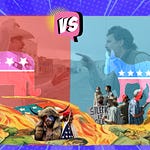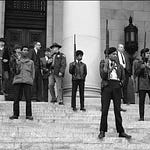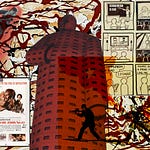Overview: Max and Shaenah explore the complexities of immigration issues, discussing how political dynamics and media coverage have shaped public perception and protest movements. They examined the origins and limitations of immigration-related slogans and movements, while analyzing how economic factors, globalization, and U.S. foreign policy influence migration patterns.
Main points:
Immigration Policy and Political Dynamics
The complexities of immigration issues, and how the topic has become a political football within a duopoly culture war. The hosts examined the increase in ICE funding across administrations and the discrepancy in deportation rates between Trump and Biden, noting how inhumane tactics in regards to immigration is a bipartisan issue.
Immigration Enforcement and Media Impact
Max discusses the recent immigration enforcement actions by ICE in Southern California, comparing the LA riots to similar actions in San Diego that received less media attention. He notes that while the protests started peacefully, media coverage and political messaging contributed to their escalation into riots, with different media outlets framing the events differently. Shaenah adds that Gavin Newsom's response to Trump's National Guard deployment could enhance his political standing, while both agreed that the two-party system limits movement potential by corralling issues into either side.
The Origins of No One Is Illegal
Max discusses the origins of the slogan "No one is illegal," tracing it back to Elie Wiesel, a Romanian-Jewish American writer and Holocaust survivor who was a Nobel Peace Prize winner and influential figure in the human rights industry. Max explained how Wiesel was a Zionist and supporter of Israel.
Immigration Discourse and Economic Factors
Max and Shaenah discuss the complexities of immigration, criticizing the use of slogans like "No one is illegal" for failing to address the root causes of immigration. They argue that such catchphrases dominate the discourse and prevent a nuanced discussion of the issue, including the impact of US foreign policy and economic conditions in immigrants' home countries. Max highlights the exploitation of undocumented workers and the need to address wage stagnation and labor conditions, while Shaenah emphasizes the role of capitalism in driving immigration and the division it creates within the working class.
Revisiting 'The Jungle's' Forgotten Message
Max and Shaenah discuss the misinterpretation of Upton Sinclair's "The Jungle," highlighting how the focus on animal cruelty overshadows the book's critique of labor conditions and worker exploitation. They reflect on the historical shift within the left, noting that past movements addressed issues like globalization, free trade, and their impacts on workers and developing countries, but these topics are largely absent from current protests.
Globalization's Impact on American Workers
The impact of globalization and trade agreements on American workers and how the political right, including Trump, has addressed grievances related to globalization, despite not caring about its effects on immigrants. As well as Hillary Clinton's support for the Trans-Pacific Partnership (TPP).
Right-Wing Populism and Globalization
The changing discourse on globalization and how right-wing populists have seized the narrative from the left. Max mentions the media backlash against journalist Angela Nagle, who was criticized for her views on globalization and immigration. They agree that the real enemy is the ruling elite, not immigrants, and that the media's portrayal of anti-immigrant sentiment is misleading.
Media Bias in Protest Coverage
Shaenah and Max discuss the political implications of recent protests and the media's portrayal of them. Max concludes that addressing the root causes of migration and challenging the ruling class should be priorities for the left.
Declining Birth Rates and Economic Issues
The declining birth rates in the Western world, attributing it to poverty, dismantled welfare states, and de-industrialization rather than immigration. They criticize the right for demonizing immigrants while ignoring the broader economic issues, such as wage stagnation since the 1970s. They also discuss concerns about the surveillance and potential crackdown on left-wing groups.
Understanding Anti-Immigrant Sentiment
Max discusses the misconceptions surrounding anti-immigrant sentiment, emphasizing that it is linked to economic issues like declining birth rates and stagnant wages. He criticizes liberal slogans and the romanticization of immigration, highlighting the challenges faced by immigrants, such as language barriers and cultural differences. Shaenah agrees, emphasizing the need to understand immigration in the context of imperialism and the role of U.S. interventions in creating the conditions that lead to mass migrations.
Protests: Expression vs. Change
The limitations and potential pitfalls of protests and while they can be a form of expression, they often lack long-term substantive change. Max and Shaenah highlight the importance of timing in protests and criticize the "No Kings" movement as inauthentic and manipulated.
Links:
https://www.bushcenter.org/catalyst/north-american-century/benefits-of-immigration-outweigh-costs/
https://www.michael-parenti.org/article-class-warfare-indeed
https://americanaffairsjournal.org/2018/11/the-left-case-against-open-borders/














